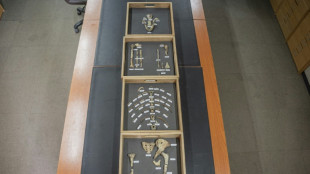
Timely Venice documentary examines Italy's fascist past

With a post-fascist party topping opinion polls ahead of Italian elections later this month, Mark Cousins's "March on Rome" at the Venice Film Festival is particularly timely.
In the out-of-competition documentary that premiered on the festival's opening day Wednesday, the Northern Irish filmmaker focuses on fascism's power to distort the truth, manipulate public opinion and promote its own narrative.
He dissects how Benito Mussolini used fascist film propaganda to create the myth of his Blackshirts' famous entry into the capital -- the March on Rome -- which immediately preceded the Italian dictator taking power in 1922.
Cousins often focuses on cinema in his work, such as 2011's "The Story of Film: An Odyssey", and the film is a forensic breakdown of how creative camerawork and clever edits can help manipulate reality.
But he drops in footage of today's populist leaders, making the point that Mussolini had no monopoly on mobilising the masses with a fiery message of patriotism, strength and heroism -- only now they use social media, not the nascent medium of film.
"When a cycle of fascism repeats itself, it doesn't repeat itself exactly the same way, it's in a new context," Cousins explained after the screening.
"Fascism adapts in an almost Darwinian way to fit the new circumstance."
The film opens with former US president Donald Trump defending his use of a Mussolini quote in a tweet.
It also shows Giorgia Meloni, whose far-right Brothers of Italy party is tipped to win the most votes in September 25 elections.
Then there are France's Marine Le Pen, Hungary's Viktor Orban, Brazilian President Jair Bolsonaro, and Russia's Vladimir Putin filling the screen as Cousins says in his signature voiceover that "new actors play parts" as the legacy of fascism continues.
Meloni, who emphasises her Christian and family values, insists she is not a fascist and that her party -- which emerged out of a movement founded by Mussolini supporters after his death -- has put its history behind it.
But speaking to journalists, Cousins referenced a fiery speech in June in support of the far-right Vox party in Spain, in which Meloni railed against the "LGBT lobby" and "Islamic violence", saying she supported "the universality of the Cross".
"What? This is crusader speak," he said.
"I believe her when she says I'm not a fascist, but this is very close to fascism and very close to white replacement theory, all that stuff."
- Myth-making -
The documentary breaks down, shot by shot, Umberto Paradisi's 1923 film "A Noi" (To Us) that jumpstarted Mussolini's propaganda machine and created the myth of the March on Rome.
Although the film ostensibly documented the Blackshirts' arrival in the capital -- and the subsequent handover of power to Mussolini -- it exaggerated the size of the crowd and cleverly disguised the fact that Il Duce himself was not even present.
"The story was a lie but it entered the repertoire," says Cousins in a voiceover.
The film then cuts to hordes of Trump supporters forcing their way into the US Capitol on January 6, 2021 -- themselves caught up in the then-president's false claims of a stolen election.
Today's misinformation is transmitted faster and wider due to the internet, Cousins said afterwards.
"You couldn't reach a million people in three days, but now you can," he told journalists, noting that a "wildfire is harder to put out than a slow-burning thing".
"We who believe in democracy and equality and the rights of minorities... we can stop the fire and we have to."
(S.G.Stein--BBZ)

 London
London

 Manchester
Manchester
 Glasgow
Glasgow
 Dublin
Dublin
 Belfast
Belfast
 Washington
Washington
 Denver
Denver
 Atlanta
Atlanta
 Dallas
Dallas
 Houston Texas
Houston Texas
 New Orleans
New Orleans
 El Paso
El Paso
 Phoenix
Phoenix
 Los Angeles
Los Angeles



